Overview
Finding an in-home caregiver for your loved one can feel overwhelming, but understanding their specific needs and preferences is a crucial first step in this journey. By recognizing what matters most to them, you can guide your search for the most suitable provider.
It’s important to remember that:
- Utilizing various resources
- Conducting thorough interviews
- Assessing compatibility
are vital steps in ensuring quality care. This not only enhances the well-being of those receiving assistance but also brings peace of mind to families.
We’re here for you, and together, we can navigate this process with compassion and care.
Introduction
In-home caregiving has emerged as a vital solution for families seeking personalized support for their loved ones, especially seniors facing challenges due to age, illness, or disability. With the increasing demand for these services, it’s essential for families to understand the nuances of in-home care as they navigate this complex landscape. There are various types of care available, each addressing emotional and financial aspects, providing a wealth of options designed to enhance the quality of life for those in need.
This article delves into the key elements of in-home caregiving, shedding light on how tailored assistance not only fosters independence but also promotes overall well-being. Imagine a scenario where your loved one can thrive in the comfort of their own home, surrounded by familiar sights and sounds. We’re here to explore how in-home care can make this a reality, ensuring that seniors receive the support they deserve while maintaining their dignity and autonomy.
Understanding In-Home Caregiving: What You Need to Know
An in-home caregiver near you provides essential, personalized assistance to individuals who require help with daily activities due to age, illness, or disability. At Best Care Nurses Registry, our dedicated caregivers, including Certified Nursing Assistants (CNA) and Home Health Aides (HHA), play a crucial role in supporting seniors. They assist with tasks such as bathing, dressing, meal preparation, medication management, and companionship. This customized assistance not only enhances the quality of life for seniors but also enables them to maintain their independence in the comfort of their own homes.
The significance of having an in-home caregiver nearby is underscored by recent statistics, revealing that 89% of patients reported satisfaction with home healthcare options in 2022, as highlighted in a case study on patient contentment. This high level of satisfaction indicates that these services effectively meet the needs and expectations of patients, underscoring the importance of quality support in fostering long-term loyalty among clients.
Effective in-home assistance programs, like those offered by Best Care Nurses Registry, have demonstrated their ability to promote elderly independence. Customized support plans that cater to the unique needs of seniors can significantly improve their overall well-being. Experts in geriatric care emphasize that personalized assistance addresses not only physical needs but also contributes to emotional and mental health, creating a holistic approach to senior care.
Moreover, the demand for home healthcare providers is projected to rise, with a need for 924,000 personal care aides and home health aides anticipated between 2021 and 2031, according to MarketsandMarkets. This trend highlights the growing recognition of the benefits of hiring an in-home caregiver, especially as families seek reliable assistance for their loved ones.
Furthermore, wage percentiles for Home Health and Personal Care Aides indicate that:
- The 10th percentile earns an hourly wage of $11.49
- The 25th percentile earns $14.00
- The median (50th percentile) earns $16.12
- The 75th percentile earns $17.57
- The 90th percentile earns $20.41
This provides insight into the economic aspects of the industry.
Testimonials from our clients further showcase the positive impact of our services. Many families express their gratitude for the compassionate support provided by our CNAs and HHAs, highlighting how our caregivers have enriched their loved ones’ quality of life. In summary, having an in-home caregiver nearby is vital for offering assistance in caregiving and enhancing the quality of life for seniors.
By providing tailored assistance, these services help individuals maintain their independence while ensuring they receive the necessary support in a familiar environment. Best Care Nurses Registry exemplifies this commitment to personalized, compassionate care, ensuring that clients receive support tailored to their unique needs. As the landscape of home healthcare continues to evolve, the emphasis on individualized support remains paramount.
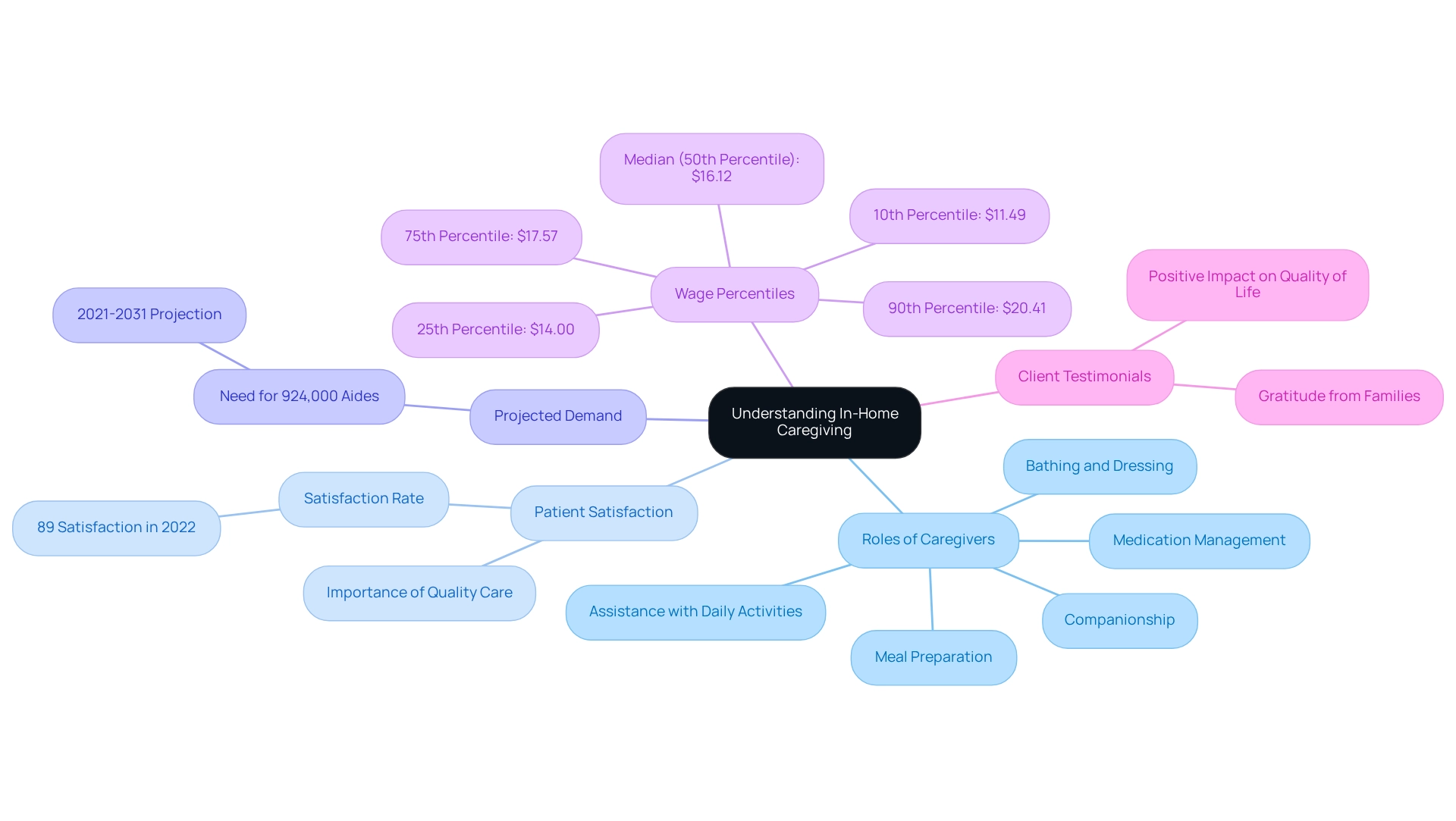
Types of In-Home Care Services: Finding the Right Fit
In-home assistance can be categorized into three main types: personal support, companionship, and skilled nursing.
-
Personal Care: This type of support encompasses assistance with daily living activities, including bathing, grooming, and meal preparation. Personal assistance is vital for seniors who may struggle with these tasks due to physical limitations or health conditions. It usually costs less than specialized nursing care, making it a more accessible choice for many households. With Best Care Nurses Registry, families can obtain a customized care plan that ensures their loved ones receive the necessary support while maintaining their dignity and independence.
-
Companionship: Companionship offerings focus on delivering social interaction and emotional support, which are crucial for sustaining mental well-being. Engaging in conversations, participating in activities, and simply having someone to share time with can significantly enhance a senior’s quality of life. Older individuals providing care, who are often supporting a spouse or partner, may especially benefit from these services, as they encounter distinctive emotional and physical challenges. Best Care Nurses Registry understands the importance of companionship and offers caregivers who are carefully screened and committed to excellence, ensuring that seniors enjoy healthy, meaningful days at home.
-
Skilled Nursing: This category involves medical assistance provided by licensed professionals, such as registered nurses (RNs) or licensed practical nurses (LPNs). Proficient nursing assistance includes administering medications, managing intricate medical conditions, and delivering wound treatment. These offerings are essential for individuals with chronic conditions or those recuperating from surgery. A study shows that 14.1% of home health episodes lead to hospital admissions, emphasizing the significance of proper treatment to avoid complications. Best Care Nurses Registry offers specialized nursing support designed to address the unique health requirements of every person, guaranteeing they receive the highest quality assistance.
Choosing the right type of in-home caregiver near you is essential to meet the specific needs of the individual. Family supporters often handle intricate medication routines and encounter difficulties in communicating with healthcare providers, as highlighted in the case study titled ‘Caregiving and Health Care.’ This underscores the necessity for tailored support.
Furthermore, Elissa S. Epel from the University of California, San Francisco, states, “Family supporters experiencing extreme stress have been shown to age prematurely.” This level of stress can take as much as 10 years off a family caregiver’s life, emphasizing the emotional toll of caregiving and the need for support.
As of 2025, the landscape of in-home support continues to evolve, with a growing emphasis on personalized and adaptable assistance solutions that cater to the unique needs of seniors. Best Care Nurses Registry distinguishes itself in this context, devoted to delivering high-quality, compassionate support customized to individual needs, assisting clients in preserving independence and quality of life. By leveraging expert insights and case studies, families can navigate the complexities of in-home care and find an in-home caregiver near them to ensure their loved ones receive the best possible support.
If you are interested in learning more about how Best Care Nurses Registry can assist you or to schedule a consultation, please call (888) 203-2529. Our team is here to provide the peace of mind you deserve, knowing your loved ones are in safe hands.
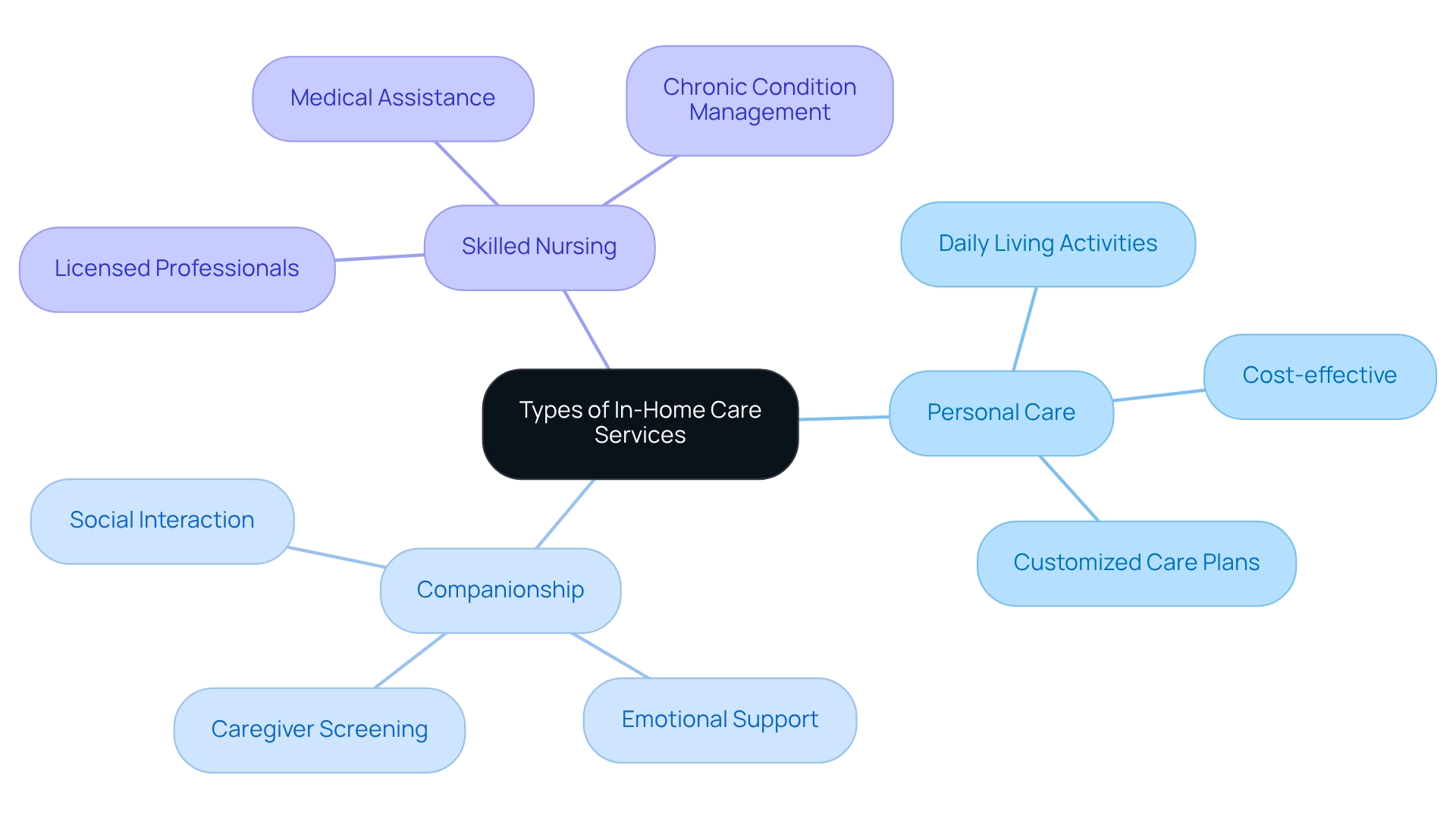
How to Search for In-Home Caregivers: Key Considerations
When searching for an in-home caregiver near me, it’s essential to start by clearly identifying your loved one’s specific needs and preferences. This foundational step will guide you in choosing the most appropriate provider. Key indicators suggesting the need for CNA/HHA support services include challenges with personal hygiene, dressing, cooking, cleaning, or managing medications.
Understanding the distinctions between CNAs (Certified Nursing Assistants) and HHAs (Home Health Aides) is crucial; CNAs typically undergo more extensive training focused on medical duties, while HHAs concentrate on personal support and daily living tasks. Utilize a variety of resources, including local agencies, online platforms, and community referrals, to help you find an in-home caregiver near me and broaden your search. Important considerations during this process should include the provider’s experience, qualifications, and their compatibility with your loved one, as these factors significantly influence the quality of care offered.
Prepare a thoughtful list of questions for interviews. Inquire about their caregiving approach, availability, and how they handle emergencies. For instance, understanding how a caregiver has previously assisted clients in challenging situations can provide valuable insight into their problem-solving abilities and emotional resilience.
This thorough evaluation process is vital for finding an in-home caregiver near me who can deliver the best support.
Statistics indicate that 23% of those providing care report a decline in their physical health due to caregiving responsibilities, highlighting the importance of choosing someone who can effectively handle the challenges of the role. Best Care Nurses Registry, with its extensive experience since 1980, stands out as a trusted provider in this field. Furthermore, a statement from the National Alliance for Caregiving and AARP indicates that 66% of individuals providing assistance find it very easy or somewhat easy to organize support recommended by health professionals and service providers, emphasizing the significance of effective communication in selecting those providing help.
Additionally, a case study titled “Providing Comfort: The Role of Aides in Hospice Care” illustrates how home health aides significantly enhance the quality of life for terminally ill patients by offering compassionate care and emotional support. This connection highlights the profound impact that a well-matched provider can have on a client’s well-being.
By focusing on these essential factors and utilizing effective methods for interviewing and selecting an in-home caregiver near me, families can ensure they find qualified individuals who not only meet their loved ones’ needs but also enhance their overall quality of life. It’s also vital to recognize the emotional burden of caregiving, as families often face immense responsibilities and stress. By choosing the right provider, families can alleviate some of this weight, allowing them to focus on their personal lives while ensuring their loved ones receive the highest quality support.
Frequent check-ins and providing feedback to the caregiver and organization can further improve the standard of assistance given.
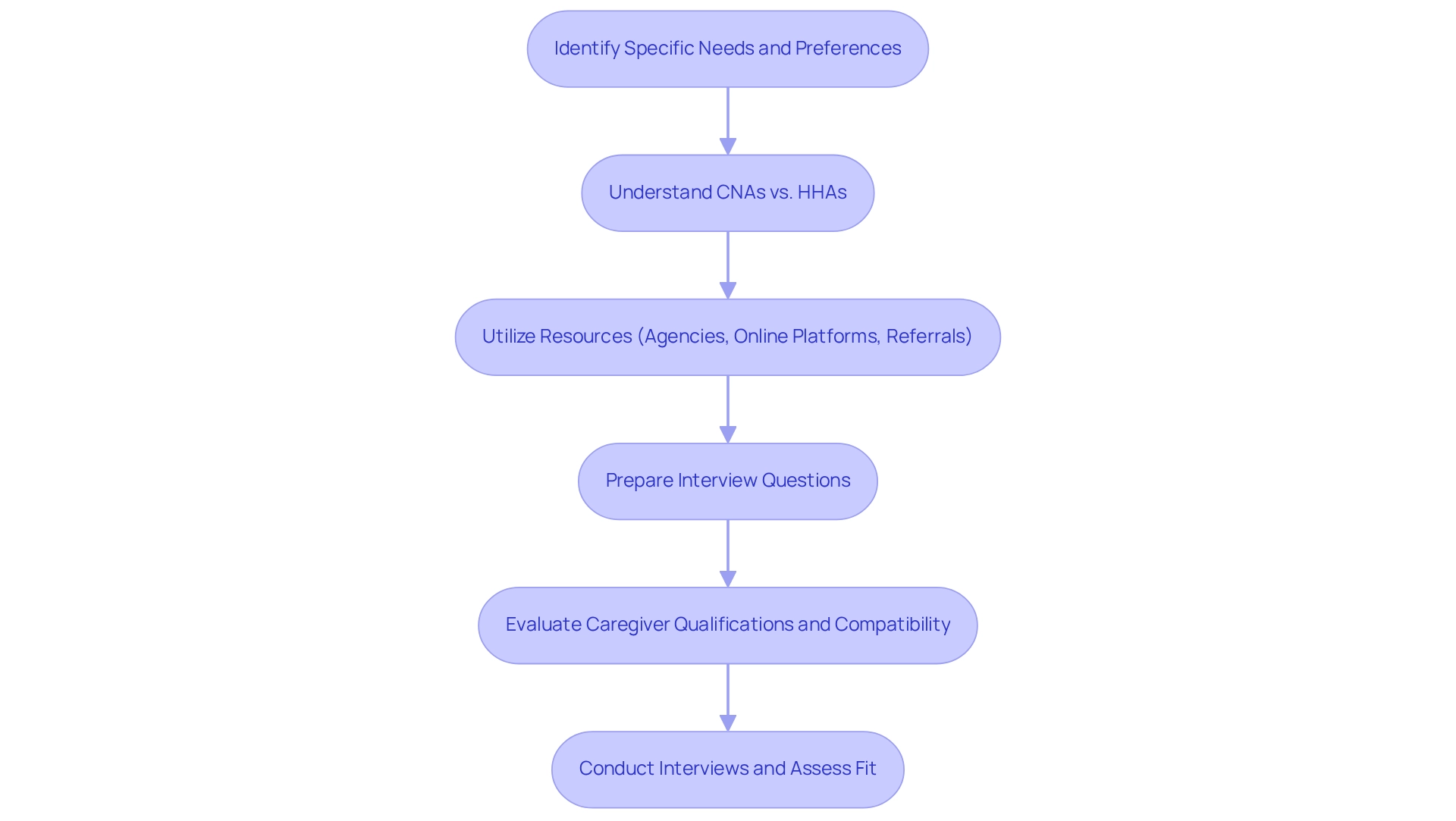
Vetting Caregivers: Ensuring Quality and Compatibility
Evaluating providers is a crucial step in ensuring quality home health services for your loved ones. This process involves conducting thorough background checks, verifying qualifications, and assessing experience. It’s essential to check references and evaluations from former clients, as these insights can provide a clearer understanding of a provider’s reliability and standard of care.
Did you know that approximately one-third of the population aged 65 and older need assistance with daily tasks? This statistic underscores the importance of selecting the right support provider for your family.
To determine if an elderly relative requires CNA (Certified Nursing Assistant) or HHA (Home Health Aide) support, families should carefully assess their loved one’s ability to carry out daily activities and overall health condition. Signs that may indicate the need for these services include difficulties with personal hygiene, dressing, cooking, cleaning, or managing medications. Health issues such as managing chronic conditions, frequent hospital stays, or recent surgeries requiring ongoing assistance are also significant factors to consider.
In addition to traditional vetting methods, consider incorporating personality evaluations to assess compatibility between the provider and your loved one. A harmonious match can greatly enhance the caregiving experience, leading to better outcomes for both parties. Expert recommendations suggest that comprehensive screening processes should include drug testing, reference checks, and validation of professional licenses to ensure patient safety and uphold the integrity of the healthcare team.
Taking proactive steps to address potential risks is vital for safeguarding the well-being of clients. Improper screening can lead to serious consequences, including lawsuits, wrongful death, negative publicity, and loss of business. Recent case studies reveal that 46% of reference and credential verifications uncover discrepancies between applicants’ claims and actual findings, emphasizing the need for meticulous background checks. Furthermore, several states, such as Wisconsin and California, have enacted laws mandating background checks for those providing care, with more states expected to follow suit. This trend highlights the growing recognition of the importance of vetting support providers to ensure the well-being of clients.
Ultimately, prioritizing compatibility and conducting thorough background checks not only protects your loved ones but also fosters a trusting relationship between support providers and clients, ensuring a higher standard of care. As Riia O’Donnell notes, social media screening may reveal whether a potential hire possesses a compassionate or indifferent nature, further enhancing the vetting process.
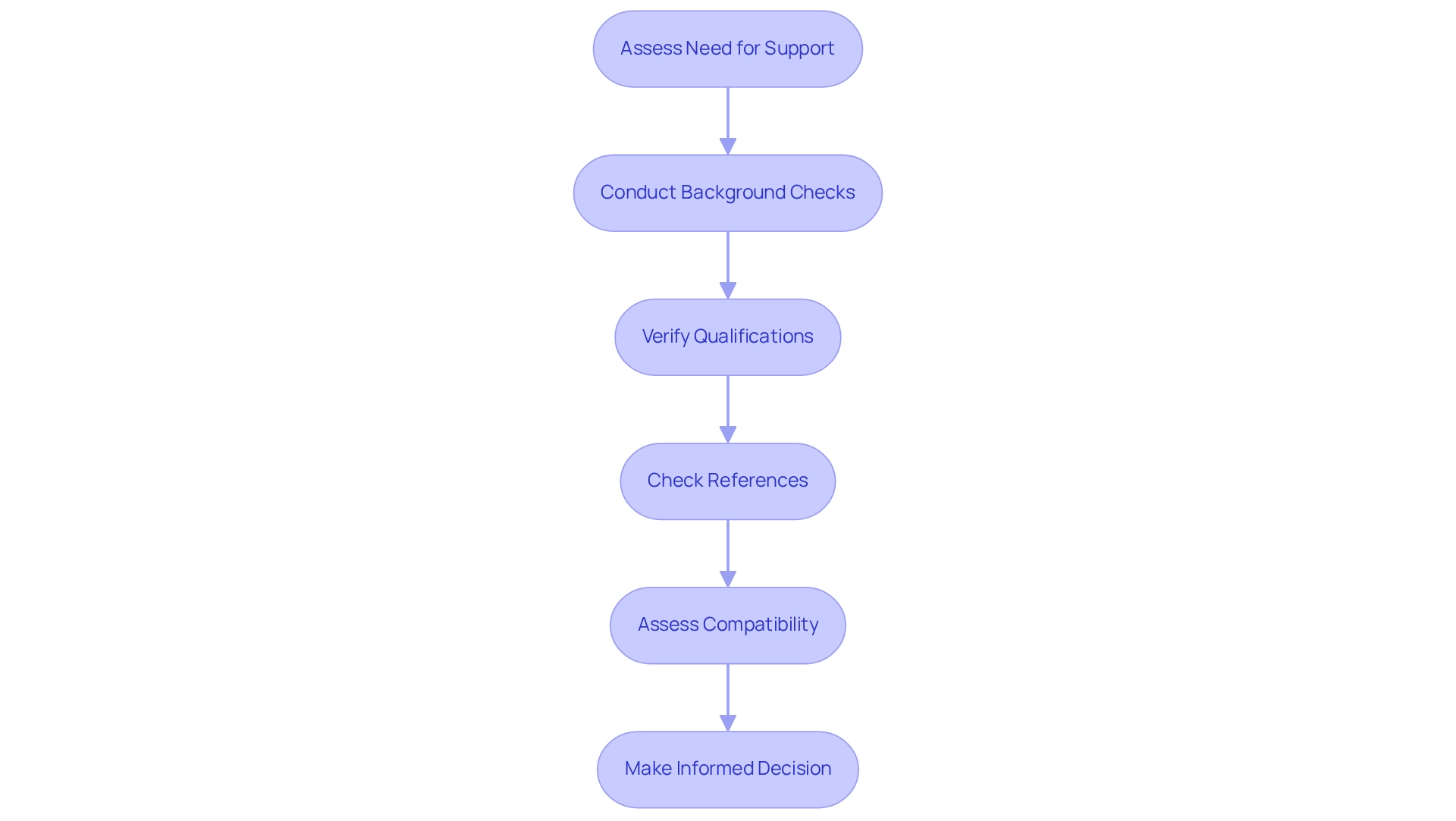
Understanding Costs: Budgeting for In-Home Care
The expense of in-house assistance can weigh heavily on families, influenced by various factors such as geographic area, the specific type of support needed, and the experience level of the caregiver. Starting in 2025, households can expect to spend between $25 and $35 per hour for an in-home caregiver near me. This reflects a 3% increase for home health aides and a notable 10% rise for homemaker support over the past year. Significantly, two-thirds of agencies charge the same fee for both types of assistance, which can help simplify budgeting for families.
To effectively manage these costs, it’s essential to explore various payment options. At Best Care Nurses Registry, we proudly accept most long-term support insurances directly on your behalf. This allows families to focus on receiving care rather than getting lost in paperwork. Most insurance carriers require a form known as an assignment of benefits (AOB) to be completed by the policyholder, facilitating direct payment to Best Care.
While Medicare does not cover activities of daily living, our services are designed to fill that gap, providing crucial support such as bathing, grooming, and companionship. Understanding your long-term assistance policy is vital, as each policy may have different requirements and waiting periods before coverage begins.
Furthermore, being aware of the average hourly rates for in-home caregivers across various states can provide valuable context for families. For instance, the suggested national wage standard for home health workers is set at $22.26 per hour, adjusted for regional cost differences. This benchmark reflects a thoughtful approach to ensuring that support provider compensation aligns with living costs and labor market trends, established through a methodology that considers existing wage variability and broader economic factors.
Families can also benefit from practical budgeting tips, such as prioritizing essential services and considering flexible assistance arrangements that may help reduce overall costs. By being proactive and informed, families can effectively navigate the financial aspects of hiring an in-home caregiver near me, ensuring that their loved ones receive high-quality, compassionate support tailored to their unique needs.
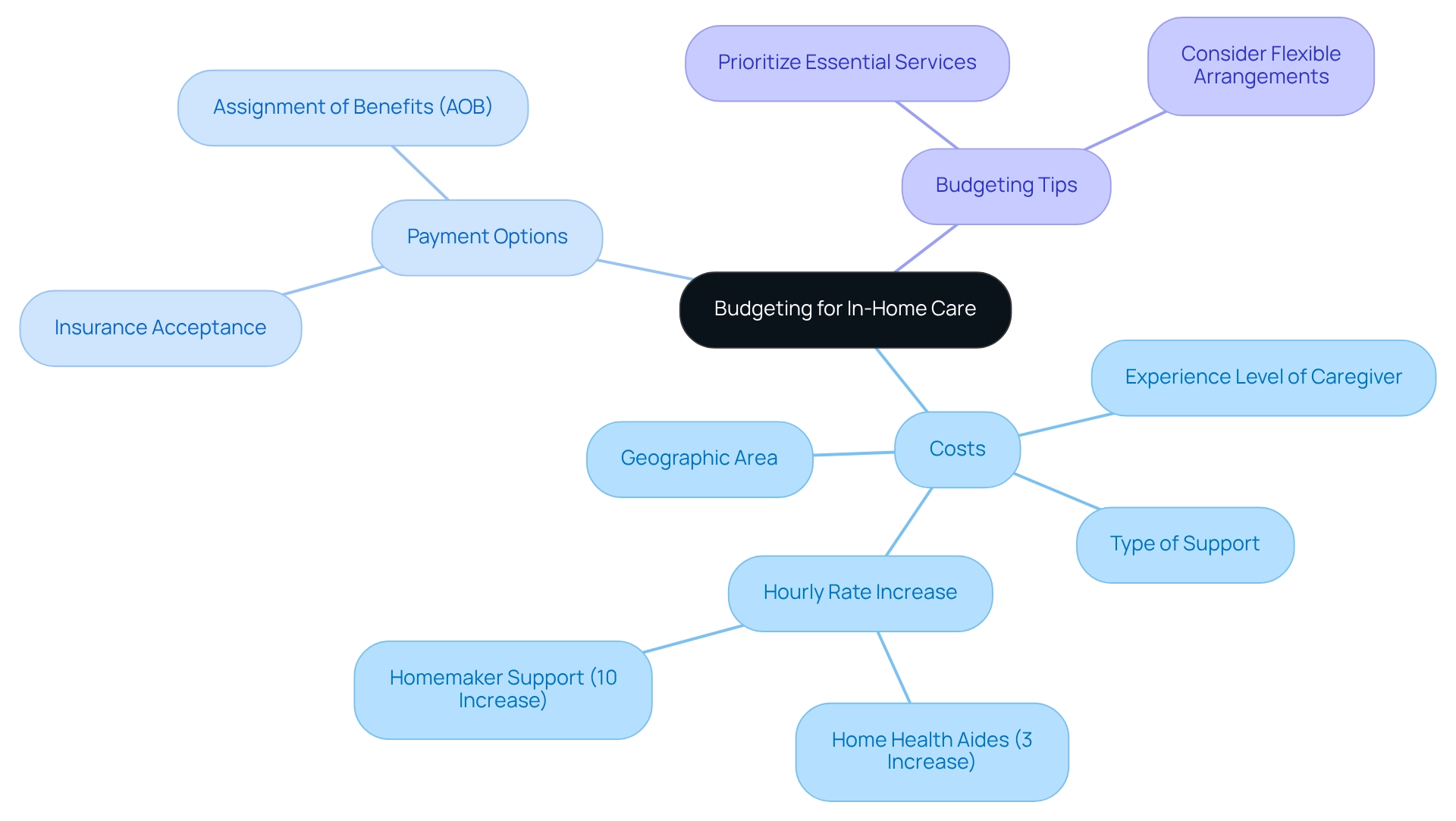
Navigating the Emotional Landscape of Caregiving
Caregiving often brings a complex mix of emotions, including stress, anxiety, and guilt. It’s important to acknowledge that those who provide care frequently encounter elevated levels of anxiety, with a significant percentage expressing feelings of guilt related to their responsibilities. Studies reveal that unpaid helpers are 3.33 times more likely to resort to substance use as a coping mechanism compared to previous years, underscoring the urgent need for support.
Moreover, 16% of full-time caregivers have a Physical Health Index (PHI) score of 77.4%, notably lower than the 83.0% score for non-caregivers. This stark contrast highlights the physical health challenges caregivers face.
To effectively manage these emotional hurdles, households should prioritize open communication. Discussing concerns and sharing responsibilities can alleviate some of the burdens associated with caregiving. Engaging in conversations about feelings and expectations fosters a supportive environment, allowing family members to express their needs and seek help when necessary.
Support groups can also play a crucial role in providing emotional relief. Successful support groups have emerged, offering a safe space for individuals to share experiences and coping strategies. These groups not only validate the emotions of caregivers but also provide practical guidance on managing stress and anxiety.
Additionally, professional counseling can be beneficial for families navigating the emotional landscape of caregiving. Psychologists emphasize that acknowledging and addressing these feelings is vital for maintaining mental health. They recommend that caregivers engage in self-care and seek resources that enhance well-being, which can significantly lower the risk of burnout and improve overall health outcomes.
As Veronica Yepez observes, “The act of providing assistance not only gives most individuals a sense of well-being but — if they also look after themselves — can decrease the provider’s risk of hospitalizations and lower mortality risks.”
Recognizing that these emotional difficulties are common among caregivers can empower households to manage more effectively. By utilizing available support resources and promoting open dialogue, caregivers can create a more positive caregiving environment, ultimately enhancing the quality of care provided to their loved ones. Furthermore, Best Care Nurses Registry accepts most Long Term Care insurances directly, allowing caregivers to focus on their loved ones without the immediate burden of payment.
With the finalization of an Assignment of Benefits (AOB), families can instruct their insurance providers to pay Best Care directly. This simplifies the process and allows for prompt access to vital assistance. This support not only alleviates financial pressure but also underscores the importance of integrated treatment strategies. It’s crucial to note that while Medicare may provide limited assistance, such as a bath visitor or very short CNA/HHA care, it does not cover comprehensive private duty caregiving services like those offered by Best Care, which include assistance with activities of daily living such as bathing, grooming, toileting, transferring, light housekeeping, meal preparation, medication reminders, and companionship.
This distinction is vital for caregivers to fully understand their options. Furthermore, the case study titled “Impact of Caregiving on Health Indicators” illustrates the connection between emotional challenges and the necessity for financial assistance, highlighting the prevalence of various health conditions and mental health issues encountered by those providing care.
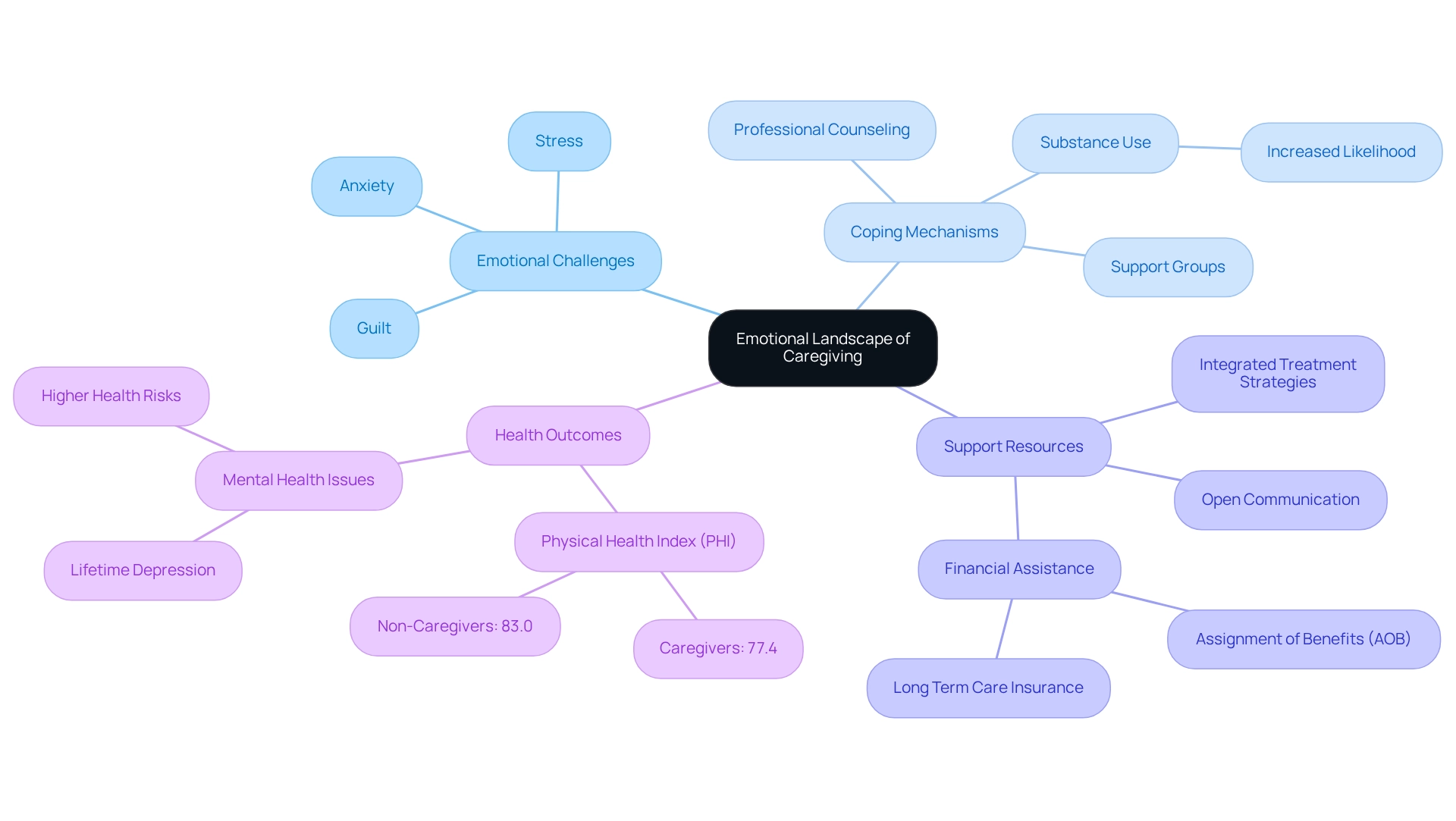
Post-Hire Support: Maintaining Quality Care and Communication
Creating a strong system for continuous communication and support after hiring a support worker is essential for ensuring high-quality assistance, especially for the elderly. Regular check-ins should be scheduled to discuss the care plan, address any concerns, and provide constructive feedback. This proactive approach encourages caregivers to share updates about your loved one’s condition and any changes in their needs, fostering a collaborative environment.
Effective communication strategies can significantly enhance the relationship between caregivers and family members. For instance, maintaining eye contact and using tailored communication styles can help build rapport, which is vital for trust and understanding. Furthermore, households should prioritize open channels of communication with support providers.
This not only assists in overseeing service standards but also enables providers to feel supported in their roles. Professional guidance suggests that households should actively engage in conversations about adjustments to support and express gratitude for the caregiver’s contributions. Such practices can enhance morale and job satisfaction. In fact, qualitative feedback from participants indicates that increased confidence and preparedness are often linked to regular communication and support.
Understanding the signs that indicate the need for CNA/HHA services is crucial. Indicators such as challenges with personal hygiene, dressing, cooking, cleaning, or managing medications, along with health issues like chronic conditions or frequent hospitalizations, can help families make informed choices about support. Additionally, CNAs (Certified Nursing Assistants) typically focus on medical tasks, while HHAs (Home Health Aides) concentrate on personal care and daily living activities. By fostering an environment of ongoing communication, families can ensure that their loved ones receive the best possible support, while caregivers feel valued and informed, ultimately leading to a more positive caregiving experience.
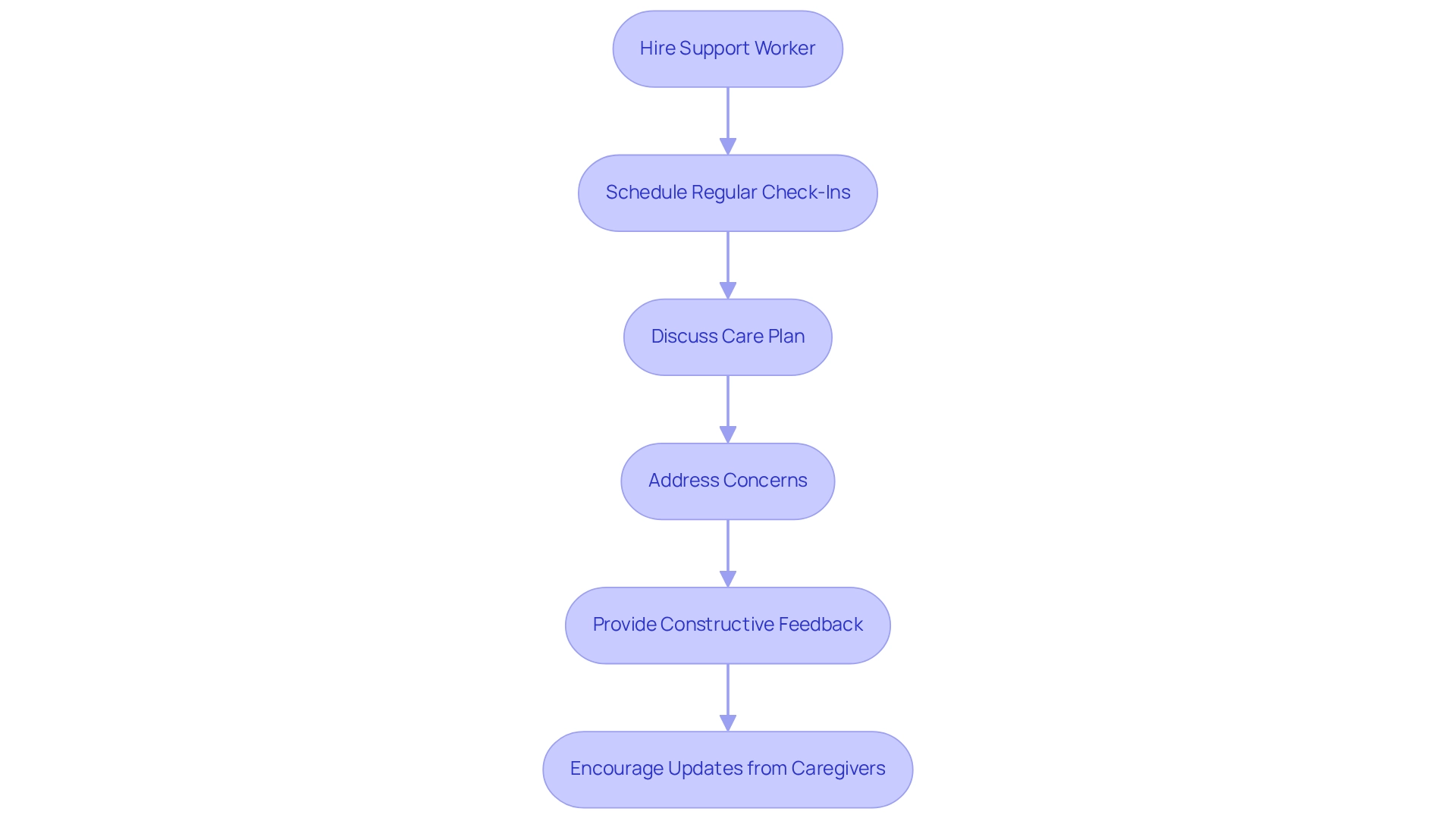
Conclusion
In-home caregiving represents a vital support system for families dedicated to the well-being of their loved ones, especially seniors who may encounter various challenges. By understanding the different forms of in-home care—personal care, companionship, and skilled nursing—families can make informed decisions that cater to the unique needs of their loved ones. This emphasis on personalized care not only enhances quality of life but also nurtures independence, allowing seniors to flourish in the comfort of their own homes.
As the demand for in-home caregiving continues to grow, families face the complexities of finding and vetting caregivers. This essential process ensures quality care, significantly impacting the emotional and physical health of both caregivers and those receiving care. Establishing effective communication and providing ongoing support are fundamental to fostering a positive caregiving environment. Furthermore, understanding the financial implications and exploring various payment options can empower families to manage the costs associated with these vital services.
Ultimately, prioritizing emotional well-being and open dialogue can ease the burdens of caregiving, enabling families to focus on what truly matters—the health and happiness of their loved ones. By leveraging resources available through trusted care providers like Best Care Nurses Registry, families can ensure their loved ones receive compassionate, high-quality support tailored to their specific needs. In this evolving landscape of in-home care, the commitment to personalized, holistic care remains paramount, offering a pathway to dignity and fulfillment for seniors.
Frequently Asked Questions
What is the role of an in-home caregiver?
An in-home caregiver provides essential, personalized assistance to individuals who need help with daily activities due to age, illness, or disability. They assist with tasks such as bathing, dressing, meal preparation, medication management, and companionship.
How does having an in-home caregiver benefit seniors?
In-home caregivers enhance the quality of life for seniors by providing customized assistance that enables them to maintain their independence in the comfort of their own homes.
What is the satisfaction rate among patients using home healthcare services?
In 2022, 89% of patients reported satisfaction with home healthcare options, indicating that these services effectively meet their needs and expectations.
What types of in-home assistance are available?
In-home assistance can be categorized into three main types: personal support, companionship, and skilled nursing.
What is included in personal care assistance?
Personal care assistance includes help with daily living activities such as bathing, grooming, and meal preparation, which is vital for seniors who may struggle with these tasks.
What is the importance of companionship in in-home care?
Companionship provides social interaction and emotional support, which are crucial for maintaining mental well-being and enhancing a senior’s quality of life.
What does skilled nursing care involve?
Skilled nursing care involves medical assistance provided by licensed professionals, including administering medications, managing medical conditions, and delivering wound treatment.
What are the economic aspects of in-home caregiving?
The wage percentiles for Home Health and Personal Care Aides indicate varying hourly wages, with the 10th percentile earning $11.49 and the 90th percentile earning $20.41.
Why is personalized assistance important in in-home care?
Personalized assistance addresses both physical and emotional needs, contributing to a holistic approach to senior care and significantly improving overall well-being.
How can families find an in-home caregiver?
Families can contact Best Care Nurses Registry to learn more about available services and schedule a consultation to find an in-home caregiver that meets their loved ones’ specific needs.











